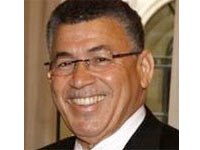
GEORGE TOWN, Cayman Islands — The Cayman Islands has scrapped plans to impose an income tax on foreign workers just two weeks after Premier McKeeva Bush, outlined plans for what he described as a “Community Enhancement Fee” to be charged at 10 percent of the remuneration paid to foreign work permit holders.
Following discussions with local business leaders, Bush said on Monday that alternative revenue sources had been identified.
“The tax would be taken off the table if robust, credible and sustainable revenue that did not hurt the poorest members of our islands was found. We are satisfied that many of the commitments from the private sector will meet these criteria,” he said.
The new revenue proposals are expected to be identified at a public meeting on Wednesday.
Several industry associations released statements opposing the tax and the private sector Cayman Finance Association said the government has not done enough to rein in government spending to justify a measure such as a payroll tax.
There have been ongoing discussion and delay in formulating a budget for the Cayman Islands, a British territory, that is acceptable to the Foreign and Commonwealth Office (FCO) in London.
Two weeks ago, Governor Duncan Taylor confirmed that negotiations on the budget with the FCO are still ongoing.
“We do not yet have an agreed budget,” Taylor said.
According to Taylor, an economic advisor sent to the Cayman Islands by the Minister for the Overseas Territories, Henry Bellingham, to work with the Cayman Islands government on the budget has returned to London but remains fully engaged in the process.
“He has set out to the Cayman Islands government the broad framework for a sustainable and credible budget. He would need to see a draft budget which fits that framework before he could recommend to Minister Bellingham that he approve it,” Taylor said.
The governor said that the economic advisor has made clear that he would expect the Cayman Islands government to achieve this through a combination of expenditure savings and measures to raise revenue: the precise nature of these is largely a matter for the Cayman Islands government but they must be credible and sustainable.
“At this time, the economic advisor is still awaiting detailed proposals on the budget from the Cayman Islands government,” Taylor emphasised.
According to Bush, in June 2012, the government presented to the FCO for its prior approval, its intended 12-month Budget for the 2012-13 fiscal year before taking the Budget to the Legislative Assembly and Finance Committee. The FCO refused that budget request.
The FCO insisted that the territory’s government strengthen its fiscal position by implementing a greater level of expenditure reductions than had hitherto been made by ministers and senior civil servants.
“The concern is to make expenditures more sustainable going forward into future fiscal years. The FCO is also of the firm view that the strengthening and improving of fiscal results for the government must not occur solely as a result of reductions to expenditure, but revenues of the government need serious enhancement and expansion,” Bush explained.
Source: Caribbean News Now



